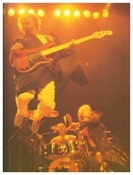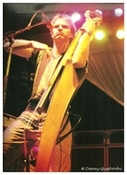
Zenyatta Mondatta
Jan
15
1981
Los Angeles, CA, US
LA Sports Arenawith Sector 27, Jools Holland
1
Doing homework on the Police...
Sometimes answers are simple if you just look in the right place.
I did my homework for the Police's Thursday night concert at the Los Angeles Sports Arena. To figure out why the British-based rock-reggae trio has suddenly become one of pop's hottest attractions, I spent three hours replaying the Police's three A&M albums.
What a waste.
I could just as well have used the time to play racquetball or to finally see 'Tess'.
Sixty seconds into the concert, the reasons for the Police's amazing rise were obvious: Sting, the band's fiendishly handsome singer and bass player.
We can talk all we want about the inspiration and artistry of the great rockers like Bruce Springsteen and Elvis Costello, but the quickest way to sell tickets is sex.
Sting, who could become rock's biggest sex symbol since Rod Stewart, has the classically chiseled good looks that ad designers and casting directors dream about. It's no wonder he was chosen for the role of Ace Face - the ultimate in male desirability - in the film 'Quadrophenia'. It's also no wonder he stole the picture with just his gaze.
Sting's impact on stage Thursday was as arresting as it was in that film about the Mod youth culture in England during the early 1960s. He moved about with the confidence and animal magnetism of someone who knows he's in demand.
And he apparently likes to tease. Sting came on stage wearing an open kimono over his white undershirt and jeans and was shrouded suggestively in the dimmest of bedroom lighting.
When the kimono finally came off, Sting's body appeared as elegantly structured as his face as he twisted and turned his way around the stage, offering some of the flashiest springs into the air since the early Peter Townshend.
I'm telling ya: the company that gets this guy to pose in the ads for their jeans will corner the market. Meanwhile, Sting and the Police are going to sell a lot more records and concert tickets.
All right: let's talk about the music.
Sting has the perfect sound in the Police's style which combines some of the energy of the new wave movement and the exotic, highly sensual shading of Jamaican reggae. He also has the ideal cohorts in power-drummer Stewart Copeland and finesse-guitarist Andy Summers.
Though the Police were lumped into the post-punk explosion in England in the late 1970s, it was clear when the band arrived at the Whisky in 1979 that it was more inspired by that kinetic style than a part of it. The band was older than most of the punk entries and they were more experienced and disciplined musicians. Their music, too, incorporated pop-ish elements.
Though the band's second album lacked the accessibility of the first, it kept interest alive in the group, setting things up nicely for the Top 10 success of the group's new 'Zenyatta Mondatta'. Downgraded by some of the band's serious fans as too poppy, the new LP revives much of the mainstream vitality exhibited in the first Police album.
Tunes like 'Don't Stand So Close', an off-beat tale of classroom temptation, inject a lighter element to the music that contrasts nicely with moody and more typical Police songs like 'Driven to Tears'. Sample line from 'Don't Stand...' ''It's no use, he sees her / He starts to shake and cough / Just like the old man in that book by Nabokov...''
Sting, who pens most of the band's tunes, isn't a dazzling writer, but he does come up occasionally with humorous or surprisingly poignant lines like that. The disappointed of Thursday's show is that the Police seemed so intent on overwhelming the audience with its energy that it sacrificed the nuances that give its music at least some character.
The result was a series of speeded-up tunes, some of which were virtually unrecognizable with the frequently horrendous sound, that served only as an exotic musical backdrop for Sting's sexy front-man role. That's not to say that the audience wasn't enthralled. These guys connected and the Police should be able to sell out two or three nights at the Sports Arena next time.
I could do without Sting's occasional vocal improvisations that dragged out what on record are nicely compact tunes, but the audience cheered everything he did during the 90-minute show with equal enthusiasm. That's star power. Here's the one guy with whom even Mick Jagger would be afraid to share the stage.
Thursday's show was opened by Sector 27, a new British band featuring singer-songwriter Tom Robinson, who first gained attention in the late 1970s by combining two-fisted political treatises in the raw-edged rock. Despite the dangers of lectures in rock, Robinson, through well-crafted tunes like 'The Summer of '79', handled the assignment well. He tones down both elements in his new music which, despite a few eloquent songs, seems a bit too commonplace on record. Things were even less effective on stage where the sound again was awful and Robinson, who looks like a good-natured CYO camp counselor, looked out-of-place in the band, part of which looked like holdovers visually from the trendy Generation X punk-pop outfits of 1979. You can check Robinson's progress in more intimate surroundings when Sector 27 plays the Whisky on Friday and next Saturday.
(c) The Los Angeles Times by Robert Hilburn
Sometimes answers are simple if you just look in the right place.
I did my homework for the Police's Thursday night concert at the Los Angeles Sports Arena. To figure out why the British-based rock-reggae trio has suddenly become one of pop's hottest attractions, I spent three hours replaying the Police's three A&M albums.
What a waste.
I could just as well have used the time to play racquetball or to finally see 'Tess'.
Sixty seconds into the concert, the reasons for the Police's amazing rise were obvious: Sting, the band's fiendishly handsome singer and bass player.
We can talk all we want about the inspiration and artistry of the great rockers like Bruce Springsteen and Elvis Costello, but the quickest way to sell tickets is sex.
Sting, who could become rock's biggest sex symbol since Rod Stewart, has the classically chiseled good looks that ad designers and casting directors dream about. It's no wonder he was chosen for the role of Ace Face - the ultimate in male desirability - in the film 'Quadrophenia'. It's also no wonder he stole the picture with just his gaze.
Sting's impact on stage Thursday was as arresting as it was in that film about the Mod youth culture in England during the early 1960s. He moved about with the confidence and animal magnetism of someone who knows he's in demand.
And he apparently likes to tease. Sting came on stage wearing an open kimono over his white undershirt and jeans and was shrouded suggestively in the dimmest of bedroom lighting.
When the kimono finally came off, Sting's body appeared as elegantly structured as his face as he twisted and turned his way around the stage, offering some of the flashiest springs into the air since the early Peter Townshend.
I'm telling ya: the company that gets this guy to pose in the ads for their jeans will corner the market. Meanwhile, Sting and the Police are going to sell a lot more records and concert tickets.
All right: let's talk about the music.
Sting has the perfect sound in the Police's style which combines some of the energy of the new wave movement and the exotic, highly sensual shading of Jamaican reggae. He also has the ideal cohorts in power-drummer Stewart Copeland and finesse-guitarist Andy Summers.
Though the Police were lumped into the post-punk explosion in England in the late 1970s, it was clear when the band arrived at the Whisky in 1979 that it was more inspired by that kinetic style than a part of it. The band was older than most of the punk entries and they were more experienced and disciplined musicians. Their music, too, incorporated pop-ish elements.
Though the band's second album lacked the accessibility of the first, it kept interest alive in the group, setting things up nicely for the Top 10 success of the group's new 'Zenyatta Mondatta'. Downgraded by some of the band's serious fans as too poppy, the new LP revives much of the mainstream vitality exhibited in the first Police album.
Tunes like 'Don't Stand So Close', an off-beat tale of classroom temptation, inject a lighter element to the music that contrasts nicely with moody and more typical Police songs like 'Driven to Tears'. Sample line from 'Don't Stand...' ''It's no use, he sees her / He starts to shake and cough / Just like the old man in that book by Nabokov...''
Sting, who pens most of the band's tunes, isn't a dazzling writer, but he does come up occasionally with humorous or surprisingly poignant lines like that. The disappointed of Thursday's show is that the Police seemed so intent on overwhelming the audience with its energy that it sacrificed the nuances that give its music at least some character.
The result was a series of speeded-up tunes, some of which were virtually unrecognizable with the frequently horrendous sound, that served only as an exotic musical backdrop for Sting's sexy front-man role. That's not to say that the audience wasn't enthralled. These guys connected and the Police should be able to sell out two or three nights at the Sports Arena next time.
I could do without Sting's occasional vocal improvisations that dragged out what on record are nicely compact tunes, but the audience cheered everything he did during the 90-minute show with equal enthusiasm. That's star power. Here's the one guy with whom even Mick Jagger would be afraid to share the stage.
Thursday's show was opened by Sector 27, a new British band featuring singer-songwriter Tom Robinson, who first gained attention in the late 1970s by combining two-fisted political treatises in the raw-edged rock. Despite the dangers of lectures in rock, Robinson, through well-crafted tunes like 'The Summer of '79', handled the assignment well. He tones down both elements in his new music which, despite a few eloquent songs, seems a bit too commonplace on record. Things were even less effective on stage where the sound again was awful and Robinson, who looks like a good-natured CYO camp counselor, looked out-of-place in the band, part of which looked like holdovers visually from the trendy Generation X punk-pop outfits of 1979. You can check Robinson's progress in more intimate surroundings when Sector 27 plays the Whisky on Friday and next Saturday.
(c) The Los Angeles Times by Robert Hilburn
Comments
1
March 21, 2017
posted by dannyolb
Top Tier
At this time, no band sounded as clear and deliberate in their delivery. Shadows in the rain, Driven to tears! Bloody hell what a bunch of talented arses..... Worth the price of the ticket times 10. Warm up music was Bob Marley to tune the sound system..... Knew we were watching the best band in the world at that time..... Never took a potty break!
Newer comments 1 - 1 of 1 Older comments




